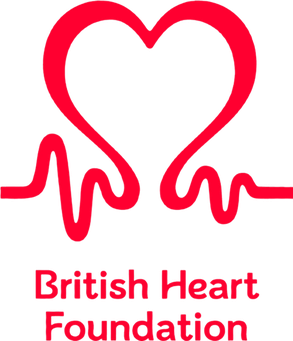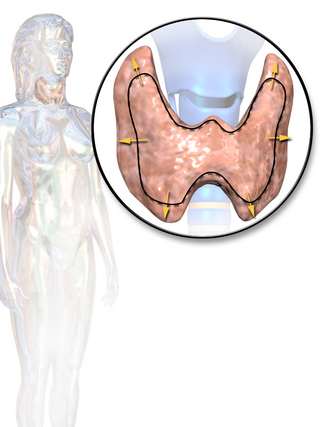
Endocrinology is a branch of biology and medicine dealing with the endocrine system, its diseases, and its specific secretions known as hormones. It is also concerned with the integration of developmental events proliferation, growth, and differentiation, and the psychological or behavioral activities of metabolism, growth and development, tissue function, sleep, digestion, respiration, excretion, mood, stress, lactation, movement, reproduction, and sensory perception caused by hormones. Specializations include behavioral endocrinology and comparative endocrinology.

Hyperthyroidism is the condition that occurs due to excessive production of thyroid hormones by the thyroid gland. Thyrotoxicosis is the condition that occurs due to excessive thyroid hormone of any cause and therefore includes hyperthyroidism. Some, however, use the terms interchangeably. Signs and symptoms vary between people and may include irritability, muscle weakness, sleeping problems, a fast heartbeat, heat intolerance, diarrhea, enlargement of the thyroid, hand tremor, and weight loss. Symptoms are typically less severe in the elderly and during pregnancy. An uncommon but life-threatening complication is thyroid storm in which an event such as an infection results in worsening symptoms such as confusion and a high temperature; this often results in death. The opposite is hypothyroidism, when the thyroid gland does not make enough thyroid hormone.

Hypothyroidism is a disorder of the endocrine system in which the thyroid gland does not produce enough thyroid hormone. It can cause a number of symptoms, such as poor ability to tolerate cold, a feeling of tiredness, constipation, slow heart rate, depression, and weight gain. Occasionally there may be swelling of the front part of the neck due to goitre. Untreated cases of hypothyroidism during pregnancy can lead to delays in growth and intellectual development in the baby or congenital iodine deficiency syndrome.
Thyroid-stimulating hormone (also known as thyrotropin, thyrotropic hormone, or abbreviated TSH) is a pituitary hormone that stimulates the thyroid gland to produce thyroxine (T4), and then triiodothyronine (T3) which stimulates the metabolism of almost every tissue in the body. It is a glycoprotein hormone produced by thyrotrope cells in the anterior pituitary gland, which regulates the endocrine function of the thyroid.

Claire Berenice Rayner, OBE was an English journalist, broadcaster, novelist and nurse, best known for her role for many years as an advice columnist.

Hashimoto's thyroiditis, also known as chronic lymphocytic thyroiditis and Hashimoto's disease, is an autoimmune disease in which the thyroid gland is gradually destroyed. A slightly broader term is autoimmune thyroiditis, identical other than that it is also used to describe a similar condition without a goitre.

The British Heart Foundation (BHF) is a cardiovascular research charity in the United Kingdom. It funds medical research related to heart and circulatory diseases and their risk factors, and runs influencing work aimed at shaping public policy and raising awareness.

Levothyroxine, also known as L-thyroxine, is a synthetic form of the thyroid hormone thyroxine (T4). It is used to treat thyroid hormone deficiency (hypothyroidism), including a severe form known as myxedema coma. It may also be used to treat and prevent certain types of thyroid tumors. It is not indicated for weight loss. Levothyroxine is taken orally (by mouth) or given by intravenous injection. Levothyroxine has a half-life of 7.5 days when taken daily, so about six weeks is required for it to reach a steady level in the blood.

Propylthiouracil (PTU) is a medication used to treat hyperthyroidism. This includes hyperthyroidism due to Graves' disease and toxic multinodular goiter. In a thyrotoxic crisis it is generally more effective than methimazole. Otherwise it is typically only used when methimazole, surgery, and radioactive iodine is not possible. It is taken by mouth.

Thyroid disease is a medical condition that affects the function of the thyroid gland. The thyroid gland is located at the front of the neck and produces thyroid hormones that travel through the blood to help regulate many other organs, meaning that it is an endocrine organ. These hormones normally act in the body to regulate energy use, infant development, and childhood development.

Carbimazole (brand names Neo-Mercazole, Anti-Thyrox, etc.) is used to treat hyperthyroidism. Carbimazole is a pro-drug as after absorption it is converted to the active form, methimazole. Methimazole prevents thyroid peroxidase enzyme from iodinating and coupling the tyrosine residues on thyroglobulin, hence reducing the production of the thyroid hormones T3 and T4 (thyroxine).
The Endocrine Society is a professional, international medical organization in the field of endocrinology and metabolism, founded in 1916 as The Association for the Study of Internal Secretions. The official name of the organization was changed to the Endocrine Society on January 1, 1952. It is a leading organization in the field and publishes four leading journals. It has more than 18,000 members from over 120 countries in medicine, molecular and cellular biology, biochemistry, physiology, genetics, immunology, education, industry, and allied health. The Society's mission is: "to advance excellence in endocrinology and promote its essential and integrative role in scientific discovery, medical practice, and human health."

Hammersmith Hospital, formerly the Military Orthopaedic Hospital, and later the Special Surgical Hospital, is a major teaching hospital in White City, West London. It is part of Imperial College Healthcare NHS Trust in the London Borough of Hammersmith and Fulham, and is associated with the Imperial College Faculty of Medicine. Confusingly the hospital is not in Hammersmith but is located in White City adjacent to Wormwood Scrubs and East Acton.
Desiccated thyroid, also known as thyroid extract, is thyroid gland that has been dried and powdered for medical use. It is used to treat hypothyroidism. It is less preferred than levothyroxine. It is taken by mouth. Maximal effects may take up to three weeks to occur.
The Patients Association is an independent charity operating in the UK that aims to improve patients' experience of healthcare. Established in 1963, it became a registered charity in 1991. The Patients Association works with patients directly: they are its members and supporters, and also the people who benefit from the organisation's help and advice services. The Chair is Ann Keen, and the Chief Executive is Rachel Power.
Thyroid disease in pregnancy can affect the health of the mother as well as the child before and after delivery. Thyroid disorders are prevalent in women of child-bearing age and for this reason commonly present as a pre-existing disease in pregnancy, or after childbirth. Uncorrected thyroid dysfunction in pregnancy has adverse effects on fetal and maternal well-being. The deleterious effects of thyroid dysfunction can also extend beyond pregnancy and delivery to affect neurointellectual development in the early life of the child. Due to an increase in thyroxine binding globulin, an increase in placental type 3 deioidinase and the placental transfer of maternal thyroxine to the fetus, the demand for thyroid hormones is increased during pregnancy. The necessary increase in thyroid hormone production is facilitated by high human chorionic gonadotropin (hCG) concentrations, which bind the TSH receptor and stimulate the maternal thyroid to increase maternal thyroid hormone concentrations by roughly 50%. If the necessary increase in thyroid function cannot be met, this may cause a previously unnoticed (mild) thyroid disorder to worsen and become evident as gestational thyroid disease. Currently, there is not enough evidence to suggest that screening for thyroid dysfunction is beneficial, especially since treatment thyroid hormone supplementation may come with a risk of overtreatment. After women give birth, about 5% develop postpartum thyroiditis which can occur up to nine months afterwards. This is characterized by a short period of hyperthyroidism followed by a period of hypothyroidism; 20–40% remain permanently hypothyroid.

Devaka Fernando is a Sri Lankan physician and academic. He was president of the Osteoporosis Society of Sri Lanka and the Founding Professor of Medicine at the University of Sri Jayawardanapura.
The American Association of Clinical Endocrinology (AACE), formerly known as the American Association of Clinical Endocrinologists, is a professional community of physicians specializing in endocrinology, diabetes, and metabolism. AACE's mission is elevating clinical endocrinology to improve global health. The association is headquartered in Jacksonville, Florida, US.
The Society for Endocrinology is an international membership organisation and registered charity representing scientists, clinicians and nurses who work with hormones. The Society was established in 1946, and currently has approximately 3,000 members.
Sir Richard Ian Samuel Bayliss was an English physician specialising in endocrinology. He became Physician to the Queen and head of the Medical Household.











